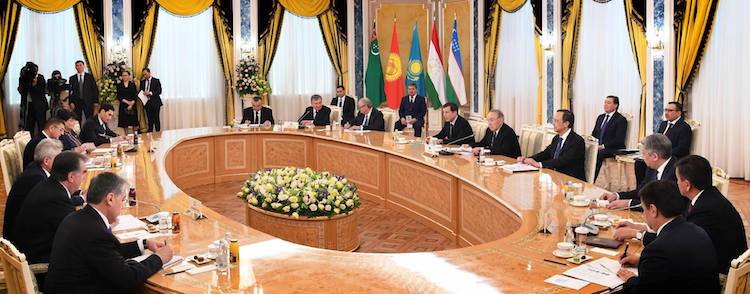By Santo D. Banerjee
NEW YORK (IDN) – When Kazakh President Nursultan Nazarbayev spoke at a high-level meeting of the United Nations Security Council on ‘non-proliferation of weapons of mass destruction: confidence-building measures’ on January 18, the Foreign Ministers of Central Asian countries attended the event. Kazakhstan convened the briefing in its capacity as the Council President for the month of January.
Nazarbayev recalled that momentous day on March 15. After a meeting of the leaders of five Central Asian states in Astana, the capital city of Kazakhstan, he said: “I am pleased to state that we have reached significant progress in political cooperation between our countries. We managed to establish dialogue between our foreign ministers. I personally was pleased to see your foreign ministers at the UN Security Council meeting in New York [in January]. It was a solid support for us. That’s what we should always do – support each other.”
The high-level briefing by President Nazarbayev was an important element in the chain of events organized during the Kazakh presidency of the Council. Kazakhstan is the first Central Asian country elected to the Security Council as a non-permanent member for a two-year period spanning 2017 and 2018. It is also the first Central Asian state to chair the Security Council.
The Council adopted a presidential statement on January 19 reaffirming its commitment to the sovereignty, independence and territorial integrity of Afghanistan and the Central Asian States.
The Security Council stresses the importance of advancing regional, interregional and international cooperation to achieve long‑term peace, stability and sustainable development in Afghanistan and Central Asia and supports the joint efforts of countries of the region towards the enhancement of a zone of peace, cooperation and prosperity including through the different platforms for cooperation.
Kairat Abdrakhmanov, Minister for Foreign Affairs of Kazakhstan, said that the President of his country, in his policy address to the Security Council in 2017, had presented his vision of creating a zone of peace, security and cooperation in Central Asia.
The meeting of five Central Asian states’ leaders in Astana, the capital city of Kazakhstan was a logical follow-up. And it was for the first time in ten years that it was held in a format addressing regional challenges, such as borders, water resource management and regional security.
The presidents of Kazakhstan, Kyrgyzstan, Tajikistan and Uzbekistan attended. Parliament’s Speaker Akja Nurberdyeva and a delegation represented Turkmenistan, including the president’s son Serdar Berdymuhamedov, who chairs the Turkmen Parliament’s Foreign Affairs Committee.
Nazarbayev proposed the establishment of a mechanism for five-sided regular consultations between the security councils of Central Asian states. The leaders also considered establishing a five-sided working commission at the level of deputy prime ministers to promote regional economic cooperation.
He furthermore stressed the importance of holding consultative meetings at the highest level, and pleaded for combining the potential of Central Asian states, increasing intraregional trade, ensuring regional security and facilitating the rapprochement of peoples.
The Kazakh President drew attention to Kazakhstan’s relations with other Central Asian states, including export relationships, intergovernmental commissions, the opening of new border crossings, the simplification of passport procedures, cooperation in building transportation infrastructure and cooperation in settling border issues.
He noted that, during the meeting, the leaders agreed that the delimitation and demarcation of borders between the five countries is a priority to strengthen security and stability in the region.
Nazarbayev outlined the need for Central Asian states to strengthen ties with the leading countries bordering the region – Russia and China.
Speaking at the meeting as a host, Nazarbayev applauded his Uzbek counterpart Shavkat Mirziyoyev for proposing the idea of holding the meeting.
Drawing attention to Kazakhstan’s trade relations with other Central Asian states, Nazarbayev said: “In 2017, Kazakhstan’s exports to each of your countries grew 35 percent. We hold meetings of intergovernmental commissions. We are opening new border crossing points, simplifying passport control procedures, building new roads and bridges, settling border issues, developing transport infrastructure and launching new flights and high-speed trains.”
Stressing the importance of regional cooperation, Kyrgyz President Sooronbay Jeenbekov said: “Today’s meeting will serve to renew and intensify our friendly and good-neighbourly relations. It will give new impetus to our common aspirations aimed at greater rapprochement of our countries and peoples.”
Tajikistan President Emomali Rahmon spoke about developing Central Asia’s transit and transport potential, rational use of water and energy resources, cultural interaction and strengthening regional security.
“The growing challenges and threats to security, such as terrorism, extremism, drug trafficking, transnational organized crime and religious radicalism call on us to use all mechanisms of effective and prompt response. Solving these issues is a priority task for our interaction, because a change in the situation in one country can negatively affect the situation in the whole region,” he said. [IDN-InDepthNews – 19 March 2018]
Photo: Central Asian Presidents meeting in Astana on 15 March 2018. Credit: The Astana Times
IDN is flagship agency of the International Press Syndicate.
facebook.com/IDN.GoingDeeper – twitter.com/InDepthNews

